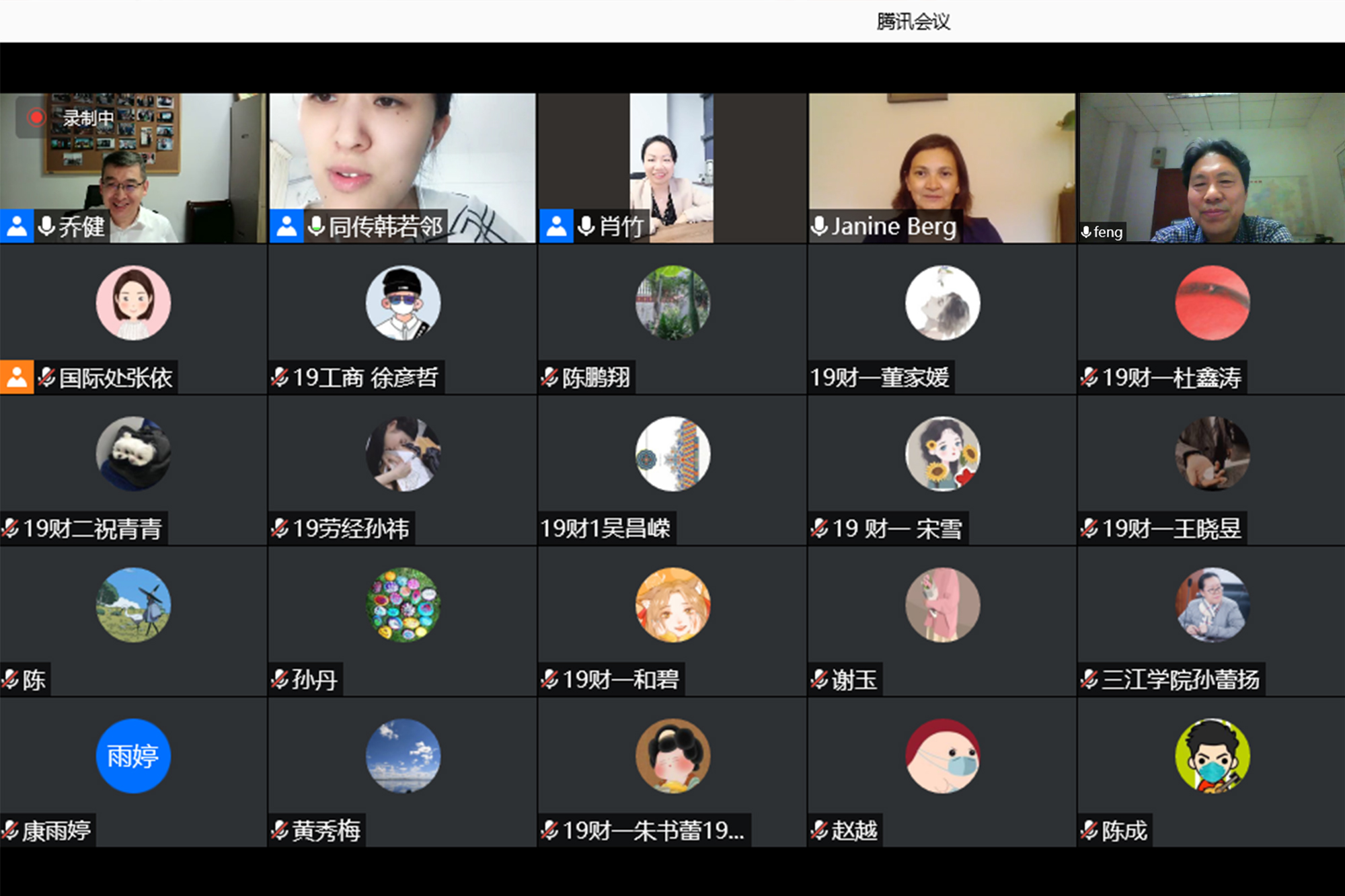On May 11, the first lecture of “2021 Series of Lectures on Global Labor Market Flexibilization and Digital Economy Employment Regulation”, organized by the CULR and co-organized by the Labor Relations Branch of Chinese Association of Human Resource Development, was held online. Dr. Janine Berg, Senior Economist at the Research Department of International Labour Organization, was the keynote speaker. He delivered a thematic report titled "The Evolving World of Work: Challenges and Opportunities for Decent Work." Professor Feng Xiliang, President of the Labor Relations Branch of Chinese Association of Human Resource Development, attended the lecture. Nearly 260 experts, scholars, and students from both within and outside the CULR participated online.

In the lecture, Dr. Jenning Berger made a panoramic presentation and analysis of the opportunities and challenges of work and decent work in the future world based on his own academic research experience. She highlighted non-standard employment types and compared the differences in temporary employment between developing and developed countries by using a large amount of real-time data. She pointed out that non-standard employment was the core of the business model of the digital labor platform, and it was necessary and practical to introduce and improve new forms of contract employment. Although the digital workforce platform had significant advantages for innovative work forms and opportunities, it also brought a series of outstanding problems, including platform labor surplus, which needed to be paid attention to. With the continuous development of technological innovation, the digital labor platform has gradually been widely and deeply integrated into various economic fields, which played a positive role in protecting the legitimate rights and interests of workers, providing decent work opportunities, promoting sustainable social and economic development, and strengthening international policy dialogue and regulatory cooperation.

In the discussion, Professor Xiao Zhu, Vice Dean of the Law School of the CULR, commented on the definition of non-standard employment concepts, the opportunities and advantages brought by non-standard employment, the third-party responsibility of platform labor dispatch, the division of the scope of work of crowdsourcing services, and the global consensus on the protection of the rights and interests of platform workers from the perspective of comparative research on international labor law, and proposed the importance of safeguarding the legitimate rights and interests of workers, establishing sound industry self-discipline management, and building harmonious labor relations in the new format. In the interactive session, President Feng Xiliang expressed his appreciation to Dr. Jennings Berger for her wonderful lectures, and expressed his gratitude to the CULR for holding a series of lectures and providing learning and exchange opportunities. He pointed out that this lecture was rich in content and had high academic value, and put forward a lot of theoretical and practical thinking for the study of related issues in the future. Professor Yang Xiaozhi, Editor-in-Chief of the Editorial Department of the CULR Journal, discussed issues such as the professional platformization of college teachers with Dr. Jianning Berger. In his concluding remarks, Professor Qiao Jian, Director of the International Office of Cooperation and Exchange, expressed his gratitude to Dr. Jianning Berger, and said that this lecture had a grand perspective and a very forward-looking theme. The lecture focused on traditional flexible employment, new forms of employment, informal employment and the regulation of employment in the digital economy, which was of enlightening significance for future labor relations research.

The world is currently undergoing significant changes. The international environment is marked by increased instability and uncertainty, with rampant pandemics, economic recessions, and the global industrial chain undergoing a major reconfiguration. The Fourth Industrial Revolution and the development of the digital economy are driving profound upgrades in industrial structures and adjustments in economic structures. Labor market flexibility and digital economy employment are becoming increasingly prevalent. China has entered a stage of high-quality development, but issues of imbalance and inadequacy remain prominent. Faced with the new situation of building harmonious labor relations and the "Industrial Reform" 2.0, regulating new forms of employment has become a prevailing trend. Against this backdrop, to promote research, exchange, comparison, mutual learning, and regulation of new employment forms between China and foreign countries, our university has organized the "2021 Series of Lectures on Global Labor Market Flexibilization and Digital Economy Employment Regulation".
(International Office of Cooperation and Exchange)
The Speaker's Profile:
Janine Berg, Ph.D. in Economics, is a senior economist in the Research Department of the International Labour Organization. Her current research focuses on the transformation of the world of work, including digital labor platforms and algorithmic management. Since joining the International Labour Organization in 2002, she has conducted research on the economic impact of labor laws, providing technical support to the ILO and countries on policies to create employment opportunities and improve working conditions. She has authored several works and articles on employment and labor market institutions and is a key author of ILO reports such as "Non-Standard Employment Around the World: Understanding Challenges, Shaping Prospects" and "Working from Home."
